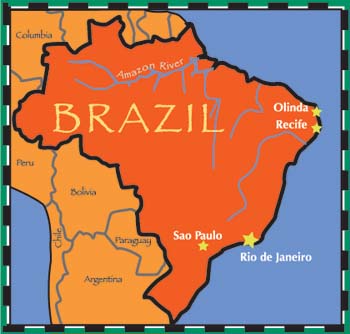 |
 |
| current issue |  |
past issues |  |
send a letter/news |  |
address update |  |
advertise |  |
about us |  |
alumni home |
Features
Turning the TideBrazilian reporters ask a Pulitzer Prize-winning journalist, "How can we stop the killing?"
by Barbara Walsh '81

|
It was 1 a.m. when I arrived in Brazil's murder capital.
A U.S. embassy worker waited for me at the airport terminal, holding a sign with my name. A man with a graying goatee and a disarming smile, he introduced himself as Edvaldo and escorted me to an SUV that I would later learn was bullet-proof.
The embassy driver headed for my hotel as Edvaldo told me about this northeastern city of Recife and its escalating violence: "Last weekend, there were 54 murders."
"Fifty-four murders?" I repeated, thinking I'd landed in a war zone.
It was my second day in Brazil and stories of murder, crime and poverty continued to astound me. The U.S. Department of State had flown me to this South American country to talk to reporters and journalism students in three different cities. My goal: to help the media reduce Brazil's crime and poverty through their reporting. After listening to the challenges they faced, I began to wonder if the journalists should pray for a miracle instead.
Five weeks earlier, in May 2007, a woman from the State Department surprised me with a phone call. She explained that reporters in Brazil had been reading my stories online about murder victims, criminals and rural poverty. They had learned that several of my stories had prompted public awareness and changed laws; they were eager to do the same in their country and wanted me to share my experiences.
I knew little about Brazil beyond its reputation for exotic Amazon wildlife and spectacular beaches. I soon found out that roughly 45,000 people are murdered there each year, making it one of the most violent countries in the world. Thousands of Brazilians live in favelas, shanty towns run by gangs and ignored by the government. Criminals rule the country's overcrowded prisons. Cops have frequent shootouts with drug dealers. I was heading to the Brazilian version of the Wild West.

|
My mother worried that I was going to get kidnapped. My husband warned me, "Don't go out at night alone." I asked the State Department for reassurance. A Brazilian U.S. consulate employee assured me, "We haven't lost a speaker yet." Now on this June evening, the embassy driver sped through red lights as we traveled through one of Brazil's most beautiful and deadly cities. Stopping at red lights in Recife is risky. Thieves and drug dealers often drag motorists from their cars, stealing their money, cell phones and jewelry. The victims are sometimes raped, beaten or killed.
As Edvaldo dropped me at my seaside hotel, he warned me not to swim in the ocean. "There are many shark attacks here." "It's not safe to drive on the streets or swim in the water," I thought as I locked my hotel door. "How can people live like this?"
The next morning, I downed miniature cups of espresso coffee before Edvaldo ushered me back into the SUV. While we drove along the river that divides Recife, Edvaldo pointed to the favelas that lined the water's edge. I glimpsed ramshackle buildings, cardboard and wooden boxes that served as homes.
"There often are drugs and prostitution, but not all favelas are to be afraid of," Edvaldo said. "There are some honest people living there. The government doesn't pay a lot of attention to these places," he added. "A lot of children don't go to school. It's very hard to convince a poor kid that they have a future. How you say? It's very sad."
Edvaldo talked about the crime that spilled from the slums to the streets and the violence that had eroded the city he grew up in. He shared a story about a school teacher who was forced from her car at 7 a.m. A 14-year-old boy shot her in the head when she refused to give up her cell phone and purse. "It is very troubling," Edvaldo said.
The more I learned about Brazil's murder and crime victims, the angrier I got. During my travels in Recife, I met Alfredo, a middle-aged man who was assaulted while driving home from work one evening. Thieves pulled him into the street, pushed him to the ground and pressed a gun to his head. They stole his cell phone and wallet as he prayed for his life. Two years later, Alfredo's 27-year-old daughter was robbed in a similar way as she drove to work at 7 a.m. The worry in Alfredo's eyes reminded me of my father.
Page: 1 2 Next >Easy to print version
blog comments powered by Disqus
